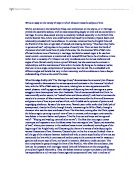The Wife of Bath's Tale is an exemplum, providing an answer to the question, "What do women want?" Chaucer uses the Wife of Bath to explain and give an example
Nauman
Amanda Nauman
Mr. Rhodes
English II H / Period 3
11 March 2005
The Selfish Hedonist
“I’ll have a husband yet / who shall be both my debtor and my slave / […] for mine shall be the power all his life” (Chaucer 262). In The Canterbury Tales, the Wife of Bath, also known as Alison, presents herself as the authority on marriage and marital life. She comments on the social and legal position of women in marriage and daily life. She claims she has her knowledge from experience, not from scriptural authority. She dictates her life story of her five previous relationships with her fellow pilgrims to show her experience. Rather than rejecting scriptural authority, she appeals to logic thus rejecting too strict interpretations of scriptural rules and commandments. She gives ridiculous details of her marriages, including her marrying old wealthy men so that she could get their money once they died. After telling the unreasonable details of her relationships, she goes on to tell a tale about an old hag and one of King Arthur’s knights. The old hag forces the knight to marry her after she helps him with a life-saving question of “What do women most want in life?” The Wife of Bath attempts to portray the idealness of a woman’s domination in the end yet she fails because the old hag becomes passive again. Through the Wife of Bath’s Prologue and Tale in The Canterbury Tales, Geoffrey Chaucer portrays the Wife of Bath as a selfish hedonist and feminist trying to gain complete control over men. Her new stand on women’s supremacy only shows her selfishness because she wasn’t trying to make a difference or revolutionize anything, she was only trying to gain personal benefits.
The Wife of Bath’s prologue is used to explain the basis of her theories on authority and sovereignty. The medieval Church at the time of the Wife of Bath saw her as a wicked woman, and she boasts about it with pride: “If I turn difficult, God give me sorrow!” (262). “Her marrying three old men in succession is a violation of not only of the law of common sense but even of the law of Nature, who would bring together those of comparable age” (Oberembt 288). Marrying another man after already being married previously is already a scandalous crime for this time period. Now to marry someone much older than herself a few times in a row is wrong not only in the eyes of God, but it is wrong along the lines of common sense too. The text of the Wife of Bath’s Prologue is based on an allegorical ‘confession’ in which she tells her sins to her audience in her life story: “O Lord, I wrecked their peace / innocent they were, without remorse!” (Chaucer 268). She confesses to deceiving and tricking her husbands just so she could get money and admits to arrange a fifth marriage while still in her fourth. In doing so, she demoralizes herself to try to be better than a man. Having more power than a man means she gets to decide, yet she goes and ruins her own reputation just so she can have an edge over men. Her rebellion against patriarchal authority and the abusive treatment of particular men expressed by the Wife of Bath are really but the projections of her selfish attitude: “His pleasures were my profit, I concurred” (269). She does not care about anyone but herself and she chooses to display that willingly. She has a self-centered interpretation of the marriage. Oberembt uses the argument that she was only twelve years old in her first marriage and that she was unable to conceive a child with her first husband which could’ve lead to her “frustration” (Oberembt 288). Through her words, and mostly through her actions, the Wife of Bath expresses her views on a wife’s domination through her own life story.







